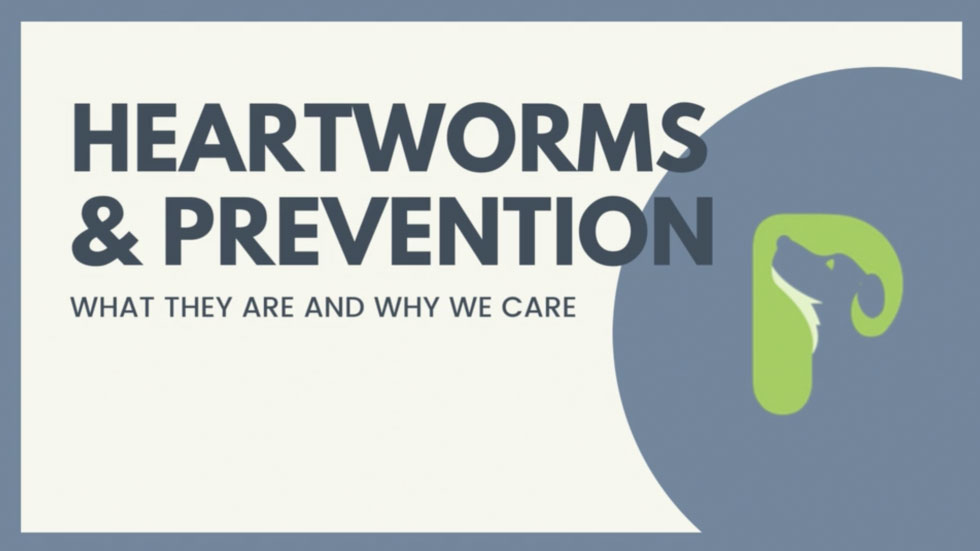Heartworms & Prevention: What They Are & Why We Care

Video Transcription:
Today, we are going to talk about heartworms and how to prevent them, and more importantly, why we actually care about all this. I am Dr. Caroline Cofer; I am a veterinarian and the owner of Pet’s Favorite Vet in Boiling Springs, South Carolina. Also, I am a certified Veterinary Acupuncturist from Chi University, and I have been practicing medicine for almost ten years. I’ve been in the veterinary field for over 20 and taking care of dogs and cats and educating their people on the things that we can do to keep them at their happiest and healthiest is absolutely my favorite thing to do.
So, we are gonna talk today about this, and let’s start with the basics. What are Heartworms? They are pretty aptly named. They are, in fact, worms that live in the heart. When they are adults, and if there are enough of them in a dog, they can actually spread into the vessels of the lungs, and you can sometimes see the little babies swimming around in the bloodstream, which is what we have on this slide right here. It’s hard to see the worm itself, but you can see the red blood cells moving all around it, and that is what we call a “microfilaria” or baby heartworm.
So how do these heartworms spread to dogs? Well, the whole lifecycle starts with an infected do. The babies are born in the heart and then swim around, just like we saw on the last slide. A mosquito comes and bites the infected dog and drinks up the babies. They grow up inside the mosquito to preteen heartworms. You absolutely have to have the mosquito. So, there is no danger in having an infected and uninfected dog with each other if you are going in at looking at adopting a dog that might already have heartworms, but if one of your dogs has heartworms, it is likely that others in your home do as well because they’ve all been exposed to the same mosquitoes.
So, the uninfected dog is bitten by a mosquito, and mosquitoes backwash that preteen heartworm into the hole that they just made into the dog’s skin, and what happens next is up to you, the dog’s owner. If the dog is on their monthly heartworm pill, that monthly dose will kill all the preteen heartworms. If they have the annual heartworm shot called “ProHeart,” the low levels of prevention in the body are gonna kill all those heartworms within two weeks. And if they are not on heartworm prevention, somewhere between 30 and 50 days after these preteens are backwashed in, they are gonna finish going through puberty. And once they have gone through puberty, we’ll think of them as teenage heartworms. They are no longer killed by heartworm prevention pills and injections. That’s why it is so important to stay on top of that monthly prevention. So, you know what, what is really going on here and here and here we show the lifecycle of the heartworm itself. The preteen heartworms go through puberty in about 30-45 days and become teenage heartworms, and then they move into the heart and lungs, and that can take up to 6 months for them to fall in love and have babies. So, the heartworm tests that your veterinarian will run yearly on your dog where just take a couple of drops of blood, and it usually takes about 10-15 minutes to get the results. That is actually a pregnancy test for heartworms. So you’ll see there actually is a 6-month gap where there could be maturing heartworms in a dog’s system, but they are not gonna test positive after these babies get into the bloodstream; they’re sucked back up by a mosquito and continue that lifecycle.
So why do we care about these? First is obviously for your dog’s health. And so, you know, a lot of folks, when they hear the heartworms are worms, they think, “Well, can I just give them a dewormer if he gets it?” So, the other worms we think about in dogs all live in the intestine, and I think we’ve all had intestinal discomfort at some point in our lives. No matter what kind of G.I. problems you had going on, the vast majority of the time, your G.I. tract is gonna go back to normal. It can be completely healed. It is very rare that that does not happen, and the same is true for dogs if they get intestinal parasites. But we all know that even if something relatively minor happens to your heart, it is not self-healing like the intestines and the rest of the G.I tract. The heart has a lot harder time healing, so even a small amount of damage is going to be permanent. So, we wanna keep that damage from happening even if we don’t see symptoms when the dog tests positive; we know that the worms are doing damage, and we know that damage will affect the dog if they live long enough.
The second thing when people ask about treatment is the treatment is not super easy. I do not know if anybody recognizes this shiny metal right here. This is arsenic, and the treatment for heartworms, if they are adults, is spaced injections of a very mild form of arsenic called “Melarsomine.” So even though this is mild, it is still arsenic, and it is really hard on them. There are some patients that will come in, especially if they have been strays or neglected, and they will not be a candidate to get their heartworms treated because their bodies can’t handle the arsenic in the treatment. And the final thing that we hear people saying about why they don’t want to keep their dogs on heartworm prevention is the cost. And so, what I typically tell them is, “If you can’t afford the prevention, you definitely not gonna be able to afford the treatment.” A 60 lbs. dog can have a year’s worth of heartworm prevention if you use the generic pills and some of the third-party online pharmacies now like Chewy. You can probably get a year’s supply for $30 – $40. The injections that last a year and you don’t have to think about are gonna run you about $100 to $130. Treatment for that same-sized dog is gonna be anywhere between $1,200 and $2,000. And so, it is definitely gonna be more cost-effective to prevent it for the whole life of the dog than to treat it one time.
I hope you enjoyed learning about heartworms today and if you have decided that you are ready to get your dog on heartworm prevention, please make an appointment with us. You can go to www.petsfavoritevet.com and click the Appointment link or give us a call at (864) 686-8583.
About Us
Pet’s Favorite Vet, founded by Dr. Caroline Cofer in 2021, offers Fear Free pet care with warmth and empathy. Our team provides low-stress handling for anxious pets and features a Play Place for cat and dog boarding, daycare, bathing, and a dog park.
